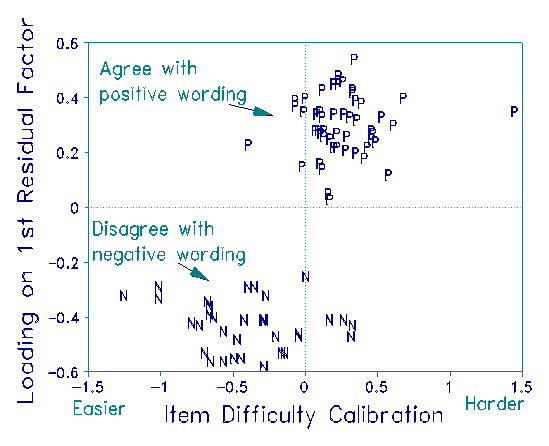
Alternation of positively and negatively worded questions on attitude surveys is frequently employed to combat response sets in the respondents. The ratings on negatively worded items are reversed so that a total positively-oriented score is obtained.
But is negative the opposite of positive? This was central to an investigation of the relationships between therapists and their mentally-ill clients. A survey instrument of 83 items was constructed based on phrases clients use in talking about their relationships with their therapists. 33 items probed negative interactions and 50 probed positive interactions. Negatively worded items were reverse scored.
Rasch analysis of the responses of 211 clients to the survey produced an item hierarchy which confirmed the expectation that it is generally easier not to say negative things about a therapist than to say positive things. Principal Components Analysis (PCA) factor analysis of residuals, however, displays more. [Winsteps Table 23]
 |
In the Figure, the x-axis corresponds to the variable. The negatively worded items, N, are relatively easy to deny, and so are to the left. The positively worded items, P, are harder to affirm. According to Rasch model specifications, residuals from the observations, after removing that part explained by the measures, should comprise random noise. Principal components analysis of those residuals across items, however, shows a clear pattern in the loadings. The first factor (explaining 13% of the variance) is the y-axis in the Figure. Positive and negative items are stratified.
The connection between positively and negatively worded items is not merely the unidimensional variable of a "more" and "less" constructive professional relationship (the x-axis). The y-axis indicates that the personal relationship between therapist and client skews the responses. Thus negative and positive items probe similar, but distinct, aspects of the therapeutic situation. To ignore this might be to overlook the critical element in successful therapy.
Jane Yamaguchi
School of Social Service Administration
University of Chicago
Positive vs. Negative Wording. Yamaguchi J. … Rasch Measurement Transactions, 1997, 11:2 p. 567.
| Forum | Rasch Measurement Forum to discuss any Rasch-related topic |
Go to Top of Page
Go to index of all Rasch Measurement Transactions
AERA members: Join the Rasch Measurement SIG and receive the printed version of RMT
Some back issues of RMT are available as bound volumes
Subscribe to Journal of Applied Measurement
Go to Institute for Objective Measurement Home Page. The Rasch Measurement SIG (AERA) thanks the Institute for Objective Measurement for inviting the publication of Rasch Measurement Transactions on the Institute's website, www.rasch.org.
| Coming Rasch-related Events | |
|---|---|
| Jan. 16 - Feb. 13, 2025, Fri.-Fri. | On-line workshop: Rasch Measurement - Core Topics (E. Smith, Winsteps), www.statistics.com |
| Apr. 8 - Apr. 11, 2026, Wed.-Sat. | National Council for Measurement in Education - Los Angeles, CA, ncme.org/events/2026-annual-meeting |
| Apr. 8 - Apr. 12, 2026, Wed.-Sun. | American Educational Research Association - Los Angeles, CA, www.aera.net/AERA2026 |
| May. 15 - June 12, 2026, Fri.-Fri. | On-line workshop: Rasch Measurement - Core Topics (E. Smith, Winsteps), www.statistics.com |
| June 19 - July 25, 2026, Fri.-Sat. | On-line workshop: Rasch Measurement - Further Topics (E. Smith, Winsteps), www.statistics.com |
The URL of this page is www.rasch.org/rmt/rmt112h.htm
Website: www.rasch.org/rmt/contents.htm